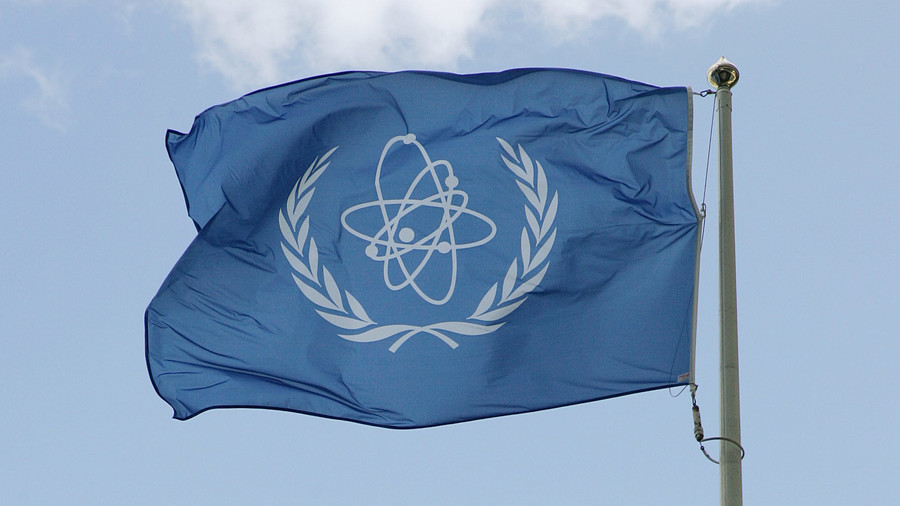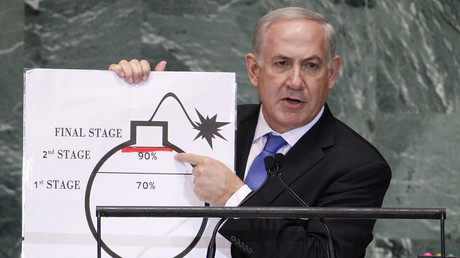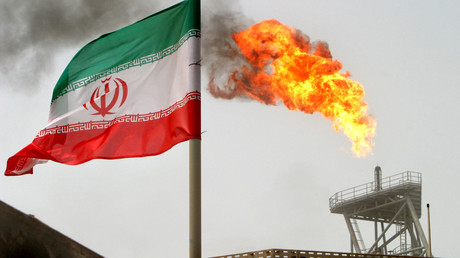- Joined
- Aug 28, 2011
- Messages
- 3,990
- Points
- 63
https://www.rt.com/news/428726-iran-boost-enrichement-capacity-iaea/
Iran to boost production of uranium enrichment material – state atomic agency
Published time: 5 Jun, 2018 02:42 Edited time: 5 Jun, 2018 03:13
Get short URL

FILE PHOTO: The flag of the International Atomic Energy Agency (IAEA) flies in front of the Vienna headquarters © Heinz-Peter Bader HPB / Reuters
The move was announced by Iran’s Atomic Energy Organization (AEOI) spokesman Behrouz Kamalvandi. The International Atomic Energy Agency (IAEA), which oversees Iran’s compliance with the 2015 JCPOA deal, will be notified of the changes on Tuesday, he told the ISNA news agency.
“In a letter that will be handed over to the International Atomic Energy Agency ... Iran will announce that the process of increasing the capacity to produce ... UF6 (uranium hexafluoride) ... will start on Tuesday,” he said.
Read more
 Iran’s FM calls on world to save nuclear deal, as Netanyahu heads to Europe in a bid to kill it
Iran’s FM calls on world to save nuclear deal, as Netanyahu heads to Europe in a bid to kill it
The spokesman said it was being done on the orders of Iranian Supreme Leader Ayatollah Ali Khamenei, who said in a speech on Monday that AEOI must promptly prepare to start uranium enrichment “up to a level of 190,000 SWU for the time being within the framework of the JCPOA (Joint Comprehensive Plan of Action).”
SWU or “separative work unit” is a standard measure of the effort needed to separate isotopes of uranium during an enrichment process. 1 SWU equals 1 kg of such effort.
Previously, Iran’s Atomic Energy Agency estimated that its enrichment capacity will reach 190,000 SWUs by the 15th year after the deal comes into effect. For that purpose, Iran planned to gradually increase its number of centrifuges, while staying within the scope of the deal.
Speaking to ISNA, Kamalvandi stressed that, by boosting its nuclear program, Iran does not seek to develop nuclear weapons. “Our goals are not to achieve a nuclear weapon, and it’s against our religious stance.”
“The message of our actions is that we will maintain our capacity for activation at a high level, and if we agreed to limit it now, it is because the parties must adhere to their commitments,” he said.
After the US exit from the deal on May 8, other parties to the landmark agreement, including France, the UK, and Germany vowed to abide by the deal and keep it intact, despite the US withdrawal. However, European nations followed the lead of Washington in demanding that Iran’s missile program and its regional posture must be a part of any future negotiations for a post-deal security framework. Iran has vehemently refused to tie its ballistic missile program, which has not been a part of the original agreement, to the deal and has called on Europe to compensate it for the impact that the reimposed US sanctions will have on its economy. On Monday, Khamenei said Europe should not expect Teheran to stay in the deal if it does nothing to shield it from the brunt of punitive measures coming its way.
Read more
 US sanctions can cut Iran’s oil sales abroad by half – BP boss
US sanctions can cut Iran’s oil sales abroad by half – BP boss
“It seems from what they say that some European governments expect the Iranian nation to both put up with sanctions and give up its nuclear activities and continue to observe limitations [on its nuclear program]. I tell those governments that this bad dream will never come true,” he said.
He again ruled out that Iran might agree to curtail its ballistic missile development, saying that it’s wishful thinking by Europe if it believes otherwise.
“I am telling the Europeans, ‘Limiting our missile work is a dream that will never come true,” Khamenei stressed.
One of the major points of Iran’s ultimatum to Europe is that it must offset the damage inflicted on its energy industry by buying Iranian oil and protecting trade with the Islamic Republic by providing banking guarantees.
Last week, a senior adviser to Khamenei, Ali Akbar Velayati, told Iranian media that the continuation of the talks would depend on Europe’s readiness to meet these demands.
“We will preserve Iran’s regional and missile power to kill US with envy,” he added.
https://www.reuters.com/article/us-...ly-high-uranium-reserve-idUSKCN0RC0A020150912
Iran says finds unexpectedly high uranium reserve
Reuters Staff
3 Min Read
The Head of the Iranian Atomic Energy Organization Ali Akbar Salehi walks through a garden at the Beau Rivage Palace Hotel during an extended round of talks in Lausanne, April 2, 2015. REUTERS/Brendan Smialowski/Pool
The comments cast doubt on previous assessments from some Western analysts who said the country had a low supply and sooner or later would need to import uranium, the raw material needed for its nuclear program.
Any indication Iran could become more self-sufficient will be closely watched by world powers, which reached a landmark deal with Tehran in July over its program. They had feared the nuclear activities were aimed at acquiring the capability to produce atomic weapons - something denied by Tehran.
“I cannot announce (the level of) Iran’s uranium mine reserves. The important thing is that before aerial prospecting for uranium ores we were not too optimistic, but the new discoveries have made us confident about our reserves,” Iranian nuclear chief Ali Akbar Salehi was quoted as saying by state news agency IRNA.
Salehi said uranium exploration had covered almost two-thirds of Iran and would be complete in the next four years.
Uranium can be used for civilian power production and scientific purposes, but is also a key ingredient in nuclear weapons.
The July deal between Iran and world powers will lift international sanctions on Iran in exchange for at least a decade of curbs on the country’s nuclear activity.
The U.S. State Department said any new reserves of uranium discovered in Iran will be under the same monitoring as existing mines under the nuclear agreement.
“Any violation of that commitment would be met with the appropriate response,” State Department spokesman John Kirby said in a statement.
After decades of effort, Iran - which has consistently said its program is for peaceful purposes - has achieved a full nuclear fuel cycle, ranging from the extraction of uranium ore to enrichment and production of fuel rods for nuclear reactors.
Sanctions on companies taking part in Iran’s uranium mining industry will be lifted when the agreement is implemented.
Salehi said uranium extraction was set to begin at a new mine in the central province of Yazd, according to IRNA.
Some Western analysts have previously said that Iran was close to exhausting its supply of yellowcake - or raw uranium - and that mining it domestically was not cost-efficient.
A report published in 2013 by U.S. think-tanks Carnegie Endowment and the Federation of American Scientists said the scarcity and low quality of Iran’s uranium resources compelled it “to rely on external sources of natural and processed uranium”.
It added: “Despite the Iranian leadership’s assertions to the contrary, Iran’s estimated uranium endowments are nowhere near sufficient to supply its planned nuclear program.”
Iran has repeatedly denied overseas media reports that it has tried to import uranium from countries like Kazakhstan and Zimbabwe.
Reporting by Bozorgmehr Sharafedin; Additional reporting by Eric Beech in Washington; Editing by Noah Browning, Pravin Char and David Gregorio
Our Standards:The Thomson Reuters Trust Principles.
Iran to boost production of uranium enrichment material – state atomic agency
Published time: 5 Jun, 2018 02:42 Edited time: 5 Jun, 2018 03:13
Get short URL

FILE PHOTO: The flag of the International Atomic Energy Agency (IAEA) flies in front of the Vienna headquarters © Heinz-Peter Bader HPB / Reuters
- 52
The move was announced by Iran’s Atomic Energy Organization (AEOI) spokesman Behrouz Kamalvandi. The International Atomic Energy Agency (IAEA), which oversees Iran’s compliance with the 2015 JCPOA deal, will be notified of the changes on Tuesday, he told the ISNA news agency.
“In a letter that will be handed over to the International Atomic Energy Agency ... Iran will announce that the process of increasing the capacity to produce ... UF6 (uranium hexafluoride) ... will start on Tuesday,” he said.
Read more
 Iran’s FM calls on world to save nuclear deal, as Netanyahu heads to Europe in a bid to kill it
Iran’s FM calls on world to save nuclear deal, as Netanyahu heads to Europe in a bid to kill it The spokesman said it was being done on the orders of Iranian Supreme Leader Ayatollah Ali Khamenei, who said in a speech on Monday that AEOI must promptly prepare to start uranium enrichment “up to a level of 190,000 SWU for the time being within the framework of the JCPOA (Joint Comprehensive Plan of Action).”
SWU or “separative work unit” is a standard measure of the effort needed to separate isotopes of uranium during an enrichment process. 1 SWU equals 1 kg of such effort.
Previously, Iran’s Atomic Energy Agency estimated that its enrichment capacity will reach 190,000 SWUs by the 15th year after the deal comes into effect. For that purpose, Iran planned to gradually increase its number of centrifuges, while staying within the scope of the deal.
Speaking to ISNA, Kamalvandi stressed that, by boosting its nuclear program, Iran does not seek to develop nuclear weapons. “Our goals are not to achieve a nuclear weapon, and it’s against our religious stance.”
“The message of our actions is that we will maintain our capacity for activation at a high level, and if we agreed to limit it now, it is because the parties must adhere to their commitments,” he said.
After the US exit from the deal on May 8, other parties to the landmark agreement, including France, the UK, and Germany vowed to abide by the deal and keep it intact, despite the US withdrawal. However, European nations followed the lead of Washington in demanding that Iran’s missile program and its regional posture must be a part of any future negotiations for a post-deal security framework. Iran has vehemently refused to tie its ballistic missile program, which has not been a part of the original agreement, to the deal and has called on Europe to compensate it for the impact that the reimposed US sanctions will have on its economy. On Monday, Khamenei said Europe should not expect Teheran to stay in the deal if it does nothing to shield it from the brunt of punitive measures coming its way.
Read more
 US sanctions can cut Iran’s oil sales abroad by half – BP boss
US sanctions can cut Iran’s oil sales abroad by half – BP boss “It seems from what they say that some European governments expect the Iranian nation to both put up with sanctions and give up its nuclear activities and continue to observe limitations [on its nuclear program]. I tell those governments that this bad dream will never come true,” he said.
He again ruled out that Iran might agree to curtail its ballistic missile development, saying that it’s wishful thinking by Europe if it believes otherwise.
“I am telling the Europeans, ‘Limiting our missile work is a dream that will never come true,” Khamenei stressed.
One of the major points of Iran’s ultimatum to Europe is that it must offset the damage inflicted on its energy industry by buying Iranian oil and protecting trade with the Islamic Republic by providing banking guarantees.
Last week, a senior adviser to Khamenei, Ali Akbar Velayati, told Iranian media that the continuation of the talks would depend on Europe’s readiness to meet these demands.
“We will preserve Iran’s regional and missile power to kill US with envy,” he added.
- 52
https://www.reuters.com/article/us-...ly-high-uranium-reserve-idUSKCN0RC0A020150912
Iran says finds unexpectedly high uranium reserve
Reuters Staff
3 Min Read
The Head of the Iranian Atomic Energy Organization Ali Akbar Salehi walks through a garden at the Beau Rivage Palace Hotel during an extended round of talks in Lausanne, April 2, 2015. REUTERS/Brendan Smialowski/Pool
The comments cast doubt on previous assessments from some Western analysts who said the country had a low supply and sooner or later would need to import uranium, the raw material needed for its nuclear program.
Any indication Iran could become more self-sufficient will be closely watched by world powers, which reached a landmark deal with Tehran in July over its program. They had feared the nuclear activities were aimed at acquiring the capability to produce atomic weapons - something denied by Tehran.
“I cannot announce (the level of) Iran’s uranium mine reserves. The important thing is that before aerial prospecting for uranium ores we were not too optimistic, but the new discoveries have made us confident about our reserves,” Iranian nuclear chief Ali Akbar Salehi was quoted as saying by state news agency IRNA.
Salehi said uranium exploration had covered almost two-thirds of Iran and would be complete in the next four years.
Uranium can be used for civilian power production and scientific purposes, but is also a key ingredient in nuclear weapons.
The July deal between Iran and world powers will lift international sanctions on Iran in exchange for at least a decade of curbs on the country’s nuclear activity.
The U.S. State Department said any new reserves of uranium discovered in Iran will be under the same monitoring as existing mines under the nuclear agreement.
“Any violation of that commitment would be met with the appropriate response,” State Department spokesman John Kirby said in a statement.
After decades of effort, Iran - which has consistently said its program is for peaceful purposes - has achieved a full nuclear fuel cycle, ranging from the extraction of uranium ore to enrichment and production of fuel rods for nuclear reactors.
Sanctions on companies taking part in Iran’s uranium mining industry will be lifted when the agreement is implemented.
Salehi said uranium extraction was set to begin at a new mine in the central province of Yazd, according to IRNA.
Some Western analysts have previously said that Iran was close to exhausting its supply of yellowcake - or raw uranium - and that mining it domestically was not cost-efficient.
A report published in 2013 by U.S. think-tanks Carnegie Endowment and the Federation of American Scientists said the scarcity and low quality of Iran’s uranium resources compelled it “to rely on external sources of natural and processed uranium”.
It added: “Despite the Iranian leadership’s assertions to the contrary, Iran’s estimated uranium endowments are nowhere near sufficient to supply its planned nuclear program.”
Iran has repeatedly denied overseas media reports that it has tried to import uranium from countries like Kazakhstan and Zimbabwe.
Reporting by Bozorgmehr Sharafedin; Additional reporting by Eric Beech in Washington; Editing by Noah Browning, Pravin Char and David Gregorio
Our Standards:The Thomson Reuters Trust Principles.
